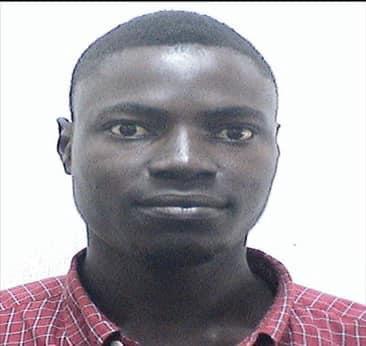“I’m telling the Anti-Crime Unit to go find the real killer. I am not the person who killed the officers.” Said Ousainou.

By Admin
Ousainou Bojang, accused of fatally shooting two officers of the Gambia Police Force in 2023, has called on the Anti-Crime Unit to identify the real killer, maintaining his innocence as his trial continues.
The prosecution alleges that on September 12, 2023, at the Sukuta traffic lights, Bojang shot three police officers, killing two and leaving one critically injured. His sister, Amie Bojang, is also facing charges of being an accessory after the fact. Bojang has denied all allegations.
During his testimony, Bojang recounted his arrest and interrogation, asserting that eyewitnesses at the Sukuta police station did not recognize him.
As the case proceeded, Counsel Lamin J. Darboe requested the station diary and asked the accused, Ousainou Bojang, if he recalled what happened at the Sukuta police station. Bojang confirmed that he did.
“Can you tell the court?” Counsel Darboe asked.
“When the senior police officer took me to the Sukuta police station, I was told I would meet the eyewitnesses. When I arrived there, I met seven individuals. The senior police officer asked them if they knew me, and they responded that they did not know me and had never met me. They said the person they saw that night was a short man wearing a white kaftan,” Ousainou explained.
He testified that one officer became emotional and told him that Commissioner Sowe was misleading the investigation, reassuring him that everything would be fine and that God was with him.
“Do you know the full name of that officer?” Counsel Darboe asked.
“No, I don’t know him, but I heard them calling him Pa Alieu Jawara,” Ousainou answered.
Ousainou continued his testimony, stating that he was taken to the Anti-Crime Unit and handed over to junior officers. Later that night, Ebou Sowe opened his cell door and asked if he expected to be released. Sowe then told him that releasing him would put his life in danger, as people would kill him.
Bojang further testified that Sowe took him to his office, where they had a conversation. At some point, Sowe offered him coffee, which he accepted without knowing how it was prepared. Shortly after drinking it, he fell asleep and later woke up back in his cell, with no recollection of how he got there.
“You mentioned that Ebou Sowe took your phone from you,” Counsel Darboe asked.
“Yes, he did,” Ousainou replied.
When questioned about the phone, Ousainou explained that Commissioner Sowe had taken the phone from his home and handed it over to Ebou Sowe at the Anti-Crime Unit.
Ousainou went on to testify that Ebou Sowe later approached him with the phone and requested that he unlock it. Despite the phone having two patterns, he removed both.
“They claimed that I was at the Sukuta Jabang traffic light shooting, but later realized that I was telling the truth because my phone log indicated that I was in Brufut at my workplace during the incident,” Ousainou emphasized.
Ousainou stated that Officer Detective Ebou Sowe reviewed his WhatsApp messages, confirming that everything he had said was consistent with his conversations with his white lady and messages to his boss.
He further testified that Officer Sowe had initially taken the phone, claiming he was there to take his statement. However, he later changed his mind and left with the phone instead.
When asked if he ever saw the phone again, Ousainou replied, “No, I only saw the smartphone in court, but when I attempted to open it to verify whether it was mine, it was locked, while the simple phone shown to him wasn’t his.”
Counsel Darboe then asked, “Do you have anything to say to the court?”
Ousainou responded, “I want to tell the Anti-Crime officers. Since they claim someone killed their officers, I’m telling them to go find the real killer. I am not the person who killed the officers.”
Counsel Darboe inquired whether he was able to get the diary he had asked his brother to bring.
Ousainou replied, “No, because my brother told me that the police took it from my house during their visit; they took away items from the house, including the diary.”
Counsel Darboe then asked, “What would happen if the diary isn’t found?”
Ousainou explained that without the diary, which contains his password, it would be difficult for him to verify whether the phone in question is his.
In response, Counsel Darboe requested that the court order the prosecution to produce the diary that the police had taken from Ousainou’s house.
In his ruling, Justice Jaiteh said the seizure of property, specifically the personal diary belonging to the accused (Ousainou) and any other items taken from his residence during the investigation to be produced.
“The Commissioner of the Anti-Crime Unit is directed to produce the personal diary taken from the accused’s residence during the investigation and the Commissioner is also called upon to provide all other items seized from the accused’s residence,” Justice Jaiteh ordered.
Justice Jaiteh emphasized that failure to comply with this order would be considered a disregard of a legal mandate.
Counsel Lamin J. Darboe requested an adjournment, explaining that confirmation of the phone’s contents is important to the case, as the diary contained the password to access the smartphone. He submitted that an adjournment would allow for the diary’s production. The matter was adjourned to February 24, 2025.


Comments are closed, but trackbacks and pingbacks are open.